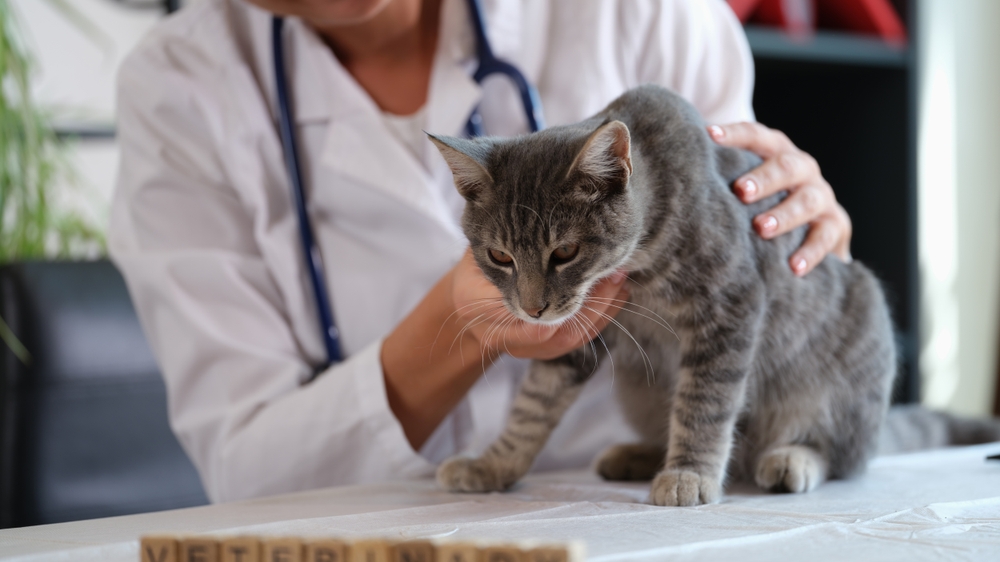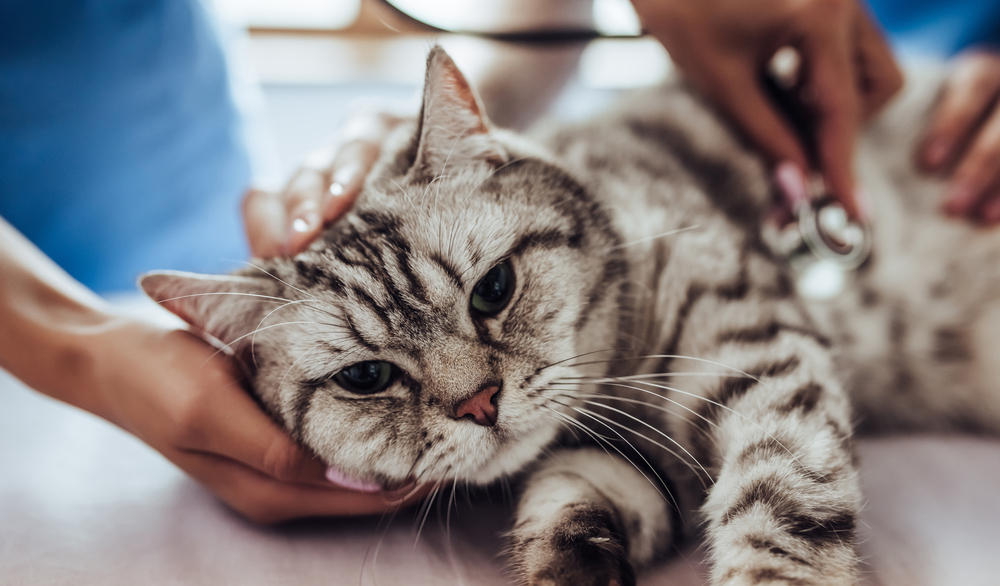When we think of cancer, we often think of a lump or swelling somewhere on your cat’s body, something that you can usually see and feel. However, with feline bone marrow cancer, there is often nothing visible. Instead, you must rely on other signs that can mimic other cat illnesses. This can make bone marrow cancer tricky to manage. Luckily, the more you know as a pet owner, the sooner you can seek veterinary care and speed up your cat’s recovery.


What is bone marrow cancer in cats?
Bone marrow is the spongy interior of the bone with a hard mineral coating on the outside. It’s pretty spectacular, as bone marrow is basically where blood is manufactured. Red blood cells, white blood cells, and platelets are made and released in the bone marrow, all of which perform important functions in the body. Bone marrow cancer in cats occurs when cancer cells take hold in the bone marrow and block the normal flow of blood that supplies these needed blood cells. In some cases, this can result in overproduction of certain types of blood cells, creating an imbalance in the number of blood cells produced, or the production of abnormal blood cells that don’t function properly. Either way, it means bad news for all of the body’s functions that depend on blood cells to function.
There are several different forms of bone marrow cancer in cats, including multiple myeloma, lymphoma, and metastatic cancer that has traveled from other parts of the body and made its way to the bone marrow. All of these types can cause similar symptoms.

What are the signs of bone marrow cancer in cats?
Rather than a direct lump or swelling, bone marrow cancer can have some rather vague signs that could be indicative of a number of diseases. These signs can include:
- Weakness, lethargy, depression
- Weight loss
- Loss of appetite
- Lameness
- Changes in behavior, such as hiding or vocalizing
- Increased water consumption
- Hematuria or blood in stool
- Unexplained bleeding
Your cat may have had frequent infections in the past, you may notice a lump or two on other parts of their body, and they may show signs of pain by meowing more, hiding more, or being less willing to move or be touched.

What causes bone marrow cancer in cats?
Fortunately, bone marrow cancer in cats is relatively rare. Unfortunately, no specific cause can be pinpointed. Bone marrow cancer appears to be caused by the same factors that cause other types of cancer, including heredity, exposure to chemicals or irritants such as smoke or toxins, and other illnesses.
Infection with feline leukemia virus or feline immunodeficiency virus also increases the chances of your cat developing bone marrow cancer or other blood abnormalities, due to factors that are associated with other types of cancer, such as exposure to ultraviolet light and certain vaccinations, which can spread to the bone marrow.
To prevent bone cancer in cats, make sure your cat is up to date on vaccinations, avoid contact with sick cats, and minimize exposure to environmental toxins. Regular veterinary care can also help; a vet can monitor your cat’s health in ways you can’t at home and can help spot diseases before they become a bigger problem.
💛 😺 Consult a vet online without leaving the comfort of your couch!

If you want to speak to a vet but can’t get there, PangobetThis is an online service. Consult a vet online Get the personalized advice your pet needs at an affordable price.
How is bone marrow cancer diagnosed in cats?
If you notice your cat is acting strangely, you might decide to wait a few days and then take him to the vet because he’s not acting right. You might notice a change in his appetite or energy levels or even weight loss, or you might be worried because he’s getting sick frequently. Either way, bone marrow cancer is probably not the first problem that comes to mind.
It probably won’t be the first thing your vet thinks of, so a thorough examination, questions, and tests will be required to rule out other causes of the symptoms you’re seeing. Blood tests may reveal abnormalities, such as differences in size, shape, or number of blood cells. They may also provide insight into how your cat’s organs are functioning. X-rays may be taken to check bone structure and look for tumors in other areas. An ultrasound may also be helpful in this test.
If the results of these tests suggest bone marrow cancer is a possibility, your veterinarian may order a urine test to look for Bence Jones protein, which is an indicator of bone marrow cancer. From there, a sample will be required to make a definitive diagnosis.

How do I care for a cat with bone marrow cancer?
In many cases, bone marrow cancer may not be curable. Treatment aims to keep your cat as comfortable as possible and maintain a good quality of life for as long as possible. How your veterinarian administers treatment will depend on the type of bone marrow cancer your cat has, your cat’s overall health, and whether the cancer has spread.
Treatment options include surgical removal if the cancer is isolated, or chemotherapy and/or radiation therapy if it is not. However, with these types of treatments, it is best to weigh the outcomes against the side effects.
Supportive care may include corticosteroids to suppress any cancer activity, painkillers to make your cat feel better, and antibiotics to treat any secondary infections caused by a weakened immune system. Hospitalization may be necessary, especially in the early stages of treatment, to make sure your cat is handling everything well and that the side effects are not too severe.
Feline bone marrow cancer is difficult to cure, especially if it arises from a metastatic tumour, so you should have a thorough discussion with your veterinarian about your cat’s quality of life and the possibility of extending it or potentially harming your cat with side effects from treatment.
At home, whether you choose to treat or not, your cat’s resistance to disease is likely lowered, so you need to keep them disease-free – that means keeping them away from unvaccinated animals, keeping them indoors, and providing them with a high-quality diet and a safe place to rest.
You may need to offer canned food or change the flavor options to encourage your cat’s appetite, make sure your cat is drinking enough water to prevent dehydration, and give her lots of affection and one-on-one time.


Frequently Asked Questions (FAQ)
What is the prognosis for bone marrow cancer in cats?
How long your cat will live with bone marrow cancer will depend on several factors, including the type of cancer, the stage, and their overall health. It will also depend on the treatment they receive and how they respond to it. While treatments can extend your cat’s quality of life for a while, the long-term prognosis for bone marrow cancer is pretty poor. Your cat will likely never be cured of bone marrow cancer, but they can at least live a comfortable life under your care.

What are the early warning signs of bone marrow cancer in cats?
Unfortunately, there are no specific signs of bone marrow cancer. Instead, you’ll notice that your cat is acting a little differently. You may not be able to directly pinpoint the cause, but you’ll know that something is wrong. He may not be eating as much as he used to, drinking a little less water, or not be as boisterous as he used to be. He may have started hiding or meowing more frequently. Either way, any changes in your cat’s habits and behavior should be checked by a veterinarian.


Conclusion
Bone marrow cancer in cats is relatively rare and can be difficult to diagnose early because the symptoms are not obvious. It is also unlikely to be cured, but that doesn’t mean that with treatment and supportive care, your cat can’t live as long and high-quality a life as possible. Talk to your veterinarian about any unusual signs or changes in behavior you notice in your cat to help catch any problems early and ensure the best possible outcome.
Featured image credit: Sata Production, Shutterstock




